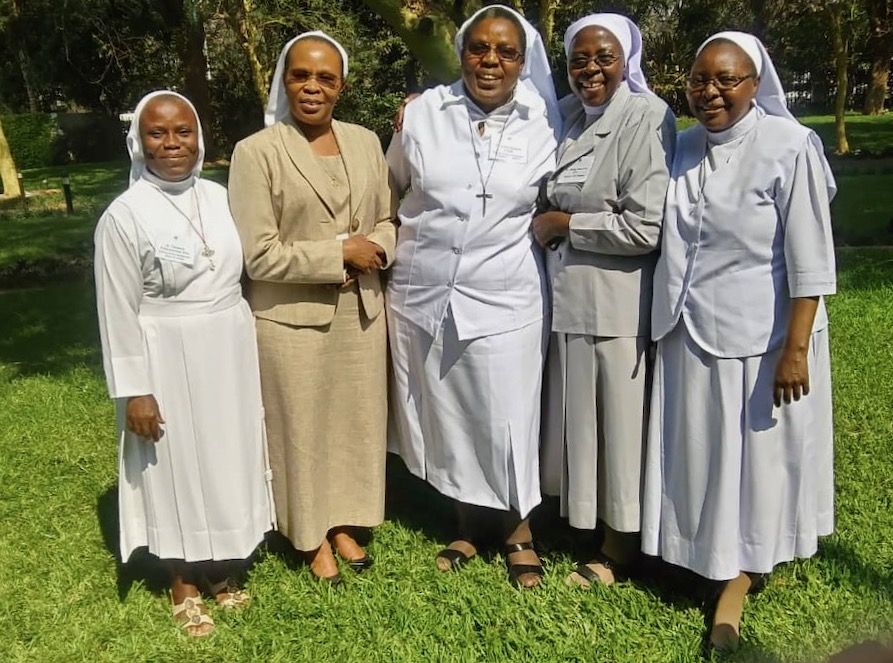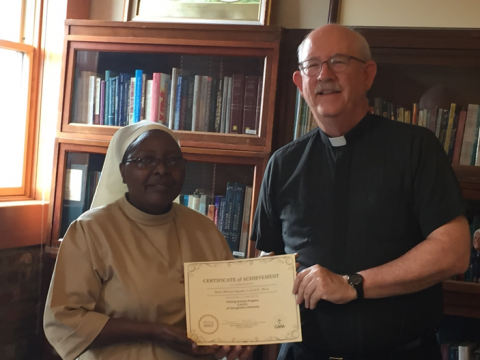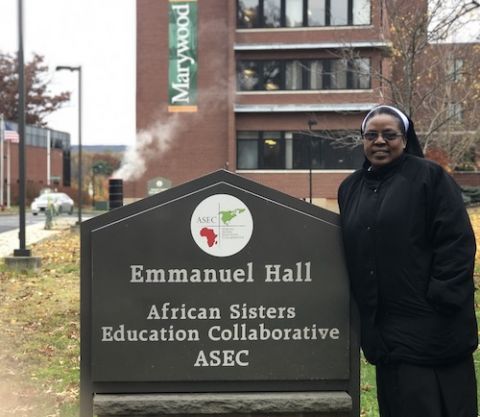CARA group c.jpeg

Six visiting scholars from five African countries sponsored by the African Sisters Education Collaborative (ASEC) have completed a mentoring program for research at the Center for Applied Research in the Apostolate (CARA) at Georgetown University in Washington, D.C. For six days in September, they, along with other religious and lay researchers, participated in a virtual, ground-breaking event at the 2020 International Consultative Research Conference organized by ASEC and CARA.
Although not a researcher myself, I love reading studies, particularly about religious life. This new endeavor of intentionally training sisters in Africa for data collection and church research will change the landscape of religious life, bringing to public attention much needed information and data about sisters' lives and work. There is very little academic research about the thousands of women religious who helped build — and continue to build and rebuild — nations around the globe through education, health care and social services, often with limited resources. I look back in amazement at women from the earliest times of Jesus who have been inspired to carry on his work among God's people. Unfortunately, these women remain a little recognized resource in the Catholic Church, missing from much of its written memory.
This gathering of more than 50 women and men, from Australia, Mexico, Poland, England, India, Nigeria, Ghana, Cameroon, Kenya, Zambia, Uganda, Tanzania, Vietnam and the U.S. will begin to change the face of church history. Sr. Draru Mary Cecilia, director of ASEC and a member of the Little Sisters of Mary Immaculate of Gulu, and Fr. Tom Gaunt, executive director of CARA, co-hosted the conference. Over six days, research studies were presented, beginning with Catherine Sexton from the Margaret Beaufort Institute of Theology, London, with her work on the Vitality of Religious Life in the United Kingdom. Fr. Luis Fernando Falco Pliego followed with initial research among women religious in Mexico revealing that dramatic changes in the past 40 years of a decline in members, social capital and finances due to caring for elders and letting go of ministries are rarely spoken about in congregations. Unwillingness to face these issues will have devastating consequences.
Advertisement
Advertisement
Trudy Dantis director of the National Center for Pastoral Research of Australia noted that a study on religious life in 2018, updated from 2009, presented current trends in religious vocations and in organizational changes in congregations. Although vocations peaked in 1964 and gradually declined due to fewer entrants and deaths, women are still entering religious life in that country: 349 in nine years, from Australia, Vietnam, Myanmar and Pacific Islands. However, smaller numbers encouraged congregations to plan for the sustainability of charisms through creative lay and inter-congregational partnerships, cross-congregational transfers, and obtaining legal Public Juridic Person status for ministerial institutions.
From Poland, Fr. Wojciech Sadlon shared research on "Communication on Intimacy, Gender and Sexuality in the Religious Communities in Poland" in a context of 30 years of freedom from communism, the currently strong religious culture and declining vocations.
The goal was to identify how religious understand the deep link between religion and sexuality, and how religious life shapes and impacts gender roles and social relationships. An interesting point he noted was how Polish culture does not recognize women religious as women, but relates to them as neutrally gendered. Even so, the women see themselves differently, and are self-reflective about their sexuality, emotions and physicality. Male religious, on the other hand engage in public life easily, but only theologize about sexuality showing limited self-reflectiveness about emotions and intimacy. Both groups reported positive attitudes about community living but hesitate to communicate among themselves, except for younger women, about personal issues. Wojciech concluded that more education about the connections of religious life with sexuality, intimacy and gender is needed.
Sr. Thu Do, a research associate at CARA and member of Lovers of the Holy Cross, presented interesting research that explored the racial/ethnic backgrounds of religious in the U.S., and how congregations are integrating racially and ethnically new members from within and outside the country into community and ministry life.
Sr. Bibiana and Fr. Thomas Gaunt CARA.png

From two pilot studies carried on over a number of years, Sr. Kevin Karimi, who belongs to the Little Sisters of St. Francis and is a researcher at ASEC, shared information about professional development of sisters in Sub-Saharan Africa. A key point for me was the difference in education between clergy and sisters, even though they often do similar pastoral work in parishes. Clergy enjoy a formal, degreed curriculum of theology and philosophy prior to ordination, but sisters have neither required formal nor accredited curriculum for profession of vows and ministry. Karimi noted that in 2015 only 2 out of 10 women religious held academic degrees* — and this ratio remains constant. She quoted Pope Francis as saying sisters are called to serve, "not to be maids," concluding that to give sisters confidence for effective service and become leaders in the church and society, they need accredited education programs in technology, theology, philosophy and canon law, along with administration and finance.
A short history and evolution of CARA was given by research associate Jonathon Wiggins. CARA was founded in 1964 as an independent church-oriented research organization, with independence being a key component to keep researchers free to present their research without interference or bias. CARA produces about 40 projects annually and began the Visiting Scholars program with ASEC in 2015.
Tara Lopatofsky, a program manager at ASEC, reviewed its history as an education organization founded by four universities that traditionally offered educational opportunities in the U.S. to sisters from Africa. The initial intention was to provide distance learning for sisters, which was discovered as not feasible, but there was need for sisters to be trained in administration, finances and leadership. This inspired the Sisters Leadership Development Initiative (SLDI) which led to the Higher Education for Sisters of Africa (HESA) program, and the Visiting Scholars program with CARA.
Joan Chisala cc.jpg

The six visiting scholars shared initial and ongoing research projects that I found very interesting. Sr. Bibiana Ngundo, a Little Sister of St. Francis, shared her work on international sisters in Kenya, inspired by a similar study in the U.S. in 2017. She reported that about 60% of 320 survey respondents were students in Kenya. They revealed that their experiences of studies were mixed. Most felt a sense of belonging, but also tiredness, anxiety/stress, chronic illness and depression. Ngundo concluded that networking and collaboration among the sister students could help with these issues, along with superiors at home listening carefully to complaints, making sure students' presence is legal, providing sufficient monetary support, openness to diversity of needs and prioritizing the education for ministry.
Sr. Joan Chisala, with the Sisters of St. John the Baptist, shared ongoing research on international sisters in Zambia, looking at population trends of women religious, relevance of religious life and sisters' entrepreneurship. Chisala, who serves as the programs coordinator for Zambia for ASEC, noted that countries of origin of congregations in Zambia represent Poland, U.S., Canada, Australia, Latin America and countries in Africa and African Caribbean.
Sisters' ministries in Nigeria was the focus for Sr. Florence Emurayeveya, of the Sisters of the Eucharistic Heart of Jesus. Ninety-five percent of the 35 survey respondents were from Nigeria and 4% from African countries. Her initial work reveals that Nigeria has a young population of sisters; a slight majority working full time in education and parish ministry. Only 2% of sisters are retired — a very different picture than the U.S.
Sr. Hellen Bandiho, who belongs to the Sisters of St. Therese of the Child Jesus and serves as secretary of the Association of Consecrated Women of East and Central Africa (ACWECA), shared research on needs sisters experience in current day ministry. Bandiho, who is from of Tanzania, used WhatsApp to contact 262 sisters from five national conferences of women religious; she discovered the following needs: preparation for social justice work, counseling, working with abuse, competency in technology and entrepreneurship. From the list, it is clear that the sisters are in touch with the needs of the people and desire training and competency to respond well and professionally. Again, there was a call for superiors to listen to these needs, as well as the clergy.
Cameroon is a country suffering from the effects of war: insurgency of Boko Haram in 2014 and current internal military conflicts. As individual sisters respond to the emerging needs of refugees and displaced families, calling them outside traditional ministries of education and health care, Sr. Margaret Mary Ajebe-Sone, who belongs to the Sisters of St. Therese of the Child Jesus of Buea, wondered how they were interpreting obedience. She discovered responsiveness to the needs arising from external conflicts are causing internal conflicts in communities. A significant question was about how much encouragement there was from leadership to discuss responding to these evolving needs. Sisters 40 years and older felt they were encouraged to question, but those younger were not. Her conclusion is the need for further study and dialogue about the evolving role of obedience in apostolic congregations.
Lesotho has few sisters and so Sr. Aloysia Makoae, a member of the Sisters of the Holy Names of Jesus and Mary, shared beginning research on the sisters' transmission of the charism with their lay partners.
Sr. Hellen Bandiho, Margaret Mary Ajebe-Sone, Aloysia Makoae c.png

Feedback and breakout sessions were important parts of the gathering, and revealed some of the ongoing needs of researchers: investment in research, development of congregational, diocesan, national conference data bases, increased opportunities for research training and mentoring; openness of church leaders at all levels to value research for development; along with potential topics: the current state of religious life globally; how congregations are connecting charisms and ministries; how living the vows needs interpretation in diverse cultures and changing world; impact of professional education on community life; best practices in inter-cultural living; and transmission of the charism to co-workers and friends.
Sr. Jane Wakahiu, a Little Sister of St. Francis and director of Conrad N. Hilton Sisters Initiative, shared exciting news of two data centers in Kenya and Uganda that will work with sisters to assist in data collection, usage of data and storage. These centers will be of great service to researchers in meeting their needs. I left the meeting feeling very hopeful about the enthusiasm I experienced from these researchers, those experienced and those just beginning.
*An earlier version of this blog post gave an incorrect statistic.
[Joyce Meyer is a member of the Sisters of the Presentation of the Blessed Virgin Mary and is GSR's liaison to women religious outside of the United States.]
Like what you're reading? Sign up for GSR e-newsletters!

